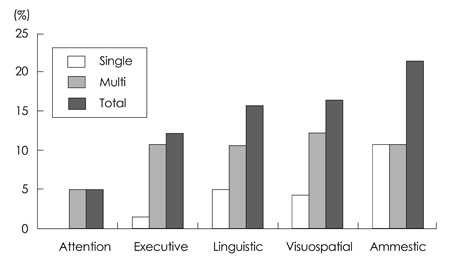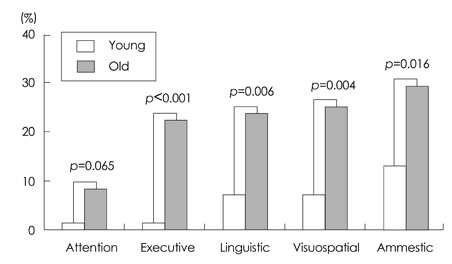J Clin Neurol.
2009 Sep;5(3):133-138. 10.3988/jcn.2009.5.3.133.
Cognitive Impairment in Parkinson's Disease without Dementia: Subtypes and Influences of Age
- Affiliations
-
- 1Department of Neurology, College of Medicine, Dong-A University, Busan, Korea. jwkim@dau.ac.kr
- KMID: 2045419
- DOI: http://doi.org/10.3988/jcn.2009.5.3.133
Abstract
- BACKGROUND AND PURPOSE
Cognitive impairments are common in Parkinson's disease (PD), although the severity of these impairments does not significantly impair the patient's daily activities. The aim of this study was to determine the frequency of mild cognitive impairment (MCI) of Parkinson's disease (PDMCI) and its subtypes in nondemented PD patients. We also evaluated the influence of age on the pattern of subtypes of PDMCI. METHODS: A total of 141 consecutive, nondemented PD patients underwent a comprehensive neuropsychological assessment covering the five cognitive domains: attention, language, visuospatial, memory, and executive functions. PDMCI was defined as impaired performance in at least one of these five cognitive domains. The influence of age on the distribution of subtypes of PDMCI was assessed by comparing patients in two groups dichotomized according to their age at assessment (younger vs. older). RESULTS: Fifty-seven (40.4%) of the nondemented PD patients had an impairment in at least one domain, and were therefore considered as having PDMCI. The age at assessment and age at disease onset were significantly higher in the PDMCI patients. The amnestic type of PDMCI was the most frequent, followed by the visuospatial, linguistic, executive, and attention types in that order. The frequency of PDMCI was higher for all subtypes in the older group; the domain that was influenced the most by age was executive function. CONCLUSIONS: MCI was common in PD and the subtypes were diverse. Age was found to be an important risk factor for the development of PDMCI, particularly for the executive subtype. These results indicate that the concept of MCI should be introduced in PD.
MeSH Terms
Figure
Reference
-
1. Janvin CC, Larsen JP, Aarsland D, Hugdahl K. Subtypes of mild cognitive impairment in Parkinson's disease: progression to dementia. Mov Disord. 2006. 21:1343–1349.
Article2. Caviness JN, Driver-Dunckley E, Connor DJ, Sabbagh MN, Hentz JG, Noble B, et al. Defining mild cognitive impairment in Parkinson's disease. Mov Disord. 2007. 22:1272–1277.
Article3. Petersen RC, Doody R, Kurz A, Mohs RC, Morris JC, Rabins PV, et al. Current concepts in mild cognitive impairment. Arch Neurol. 2001. 58:1985–1992.
Article4. Foltynie T, Brayne CE, Robbins TW, Barker RA. The cognitive ability of an incident cohort of Parkinson's patients in the UK. The Cam-PaIGN study. Brain. 2004. 127(Pt 3):550–560.
Article5. Hughes AJ, Daniel SE, Blankson S, Lees AJ. A clinicopathologic study of 100 cases of Parkinson's disease. Arch Neurol. 1993. 50:140–148.
Article6. Emre M, Aarsland D, Brown R, Burn DJ, Duyckaerts C, Mizuno Y, et al. Clinical diagnostic criteria for dementia associated with Parkinson's disease. Mov Disord. 2007. 22:1689–1707.
Article7. Fahn S, Elton RI. Members of the UPDRS Development Committee. Fahn S, Marsden CD, Calne DB, Golstein M, editors. Recent development in Parkinson's disease. 1987. vol. 2. New York: Macmillan Health Care Information;153–164.8. Hoehn MM, Yahr MD. Parkinsonism: onset, progression and mortality. Neurology. 1967. 17:427–442.
Article9. Kang Y, Na DL. Seoul Neuropsychological Screening Battery. 2003. Incheon: Human Brain Research & Consulting Co..10. Lattin J, Carroll JD, Green P. Analyzing Multivariate Data. 2003. London: Duxbury.11. Kim H, Na DL. Normative data on the Korean version of the Boston Naming Test. J Clin Exp Neuropsychol. 1999. 21:127–133.12. Muslimovic D, Post B, Speelman JD, Schmand B. Cognitive profile of patients with newly diagnosed Parkinson's disease. Neurology. 2005. 65:1239–1245.
Article13. Green J, McDonald WM, Vitek JL, Evatt M, Freeman A, Haber M, et al. Cognitive impairments in advanced PD without dementia. Neurology. 2002. 59:1320–1324.
Article14. Dubois B, Pillon B, Sternic N, Lhermitte F, Agid Y. Age-induced cognitive disturbances in Parkinson's disease. Neurology. 1990. 40:38–41.
Article15. Katzen H, Levin B, Llabre ML. Age of disease onset influences cognition in Parkinson's disease. J Int Neuropsychol Soc. 1998. 4:285–290.
Article16. Aarsland D, Andersen K, Larsen JP, Lolk A, Nielsen H, Kragh-Sørensen P. Risk of dementia in Parkinson's disease: a community-based, prospective study. Neurology. 2001. 56:730–736.
Article17. Hughes TA, Ross HF, Musa S, Bhattacherjee S, Nathan RN, Mindham RH, et al. A 10-year study of the incidence of and factors predicting dementia in Parkinson's disease. Neurology. 2000. 54:1596–1602.
Article18. Uekermann J, Daum I, Peters S, Wiebel B, Przuntek H, Müller T. Depressed mood and executive dysfunction in early Parkinson's disease. Acta Neurol Scand. 2003. 107:341–348.
Article19. Petersen RC, Smith GE, Waring SC, Ivnik RJ, Tangalos EG, Kokmen E. Mild cognitive impairment: clinical characterization and outcome. Arch Neurol. 1999. 56:303–308.20. Boeve BF, Ferman TJ, Smith GE, Knopman DS, Jicha GA, Geda YE, et al. Mild cognitive impairment preceding dementia with Lewy bodies. Neurology. 2004. 62:suppl 5. A86–A87.21. Petersen RC. Mild cognitive impairment as a diagnostic entity. J Intern Med. 2004. 256:183–194.
Article22. Emre M, Aarsland D, Albanese A, Byrne EJ, Deuschl G, De Deyn PP, et al. Rivastigmine for dementia associated with Parkinson's disease. N Engl J Med. 2004. 351:2509–2518.
Article
- Full Text Links
- Actions
-
Cited
- CITED
-
- Close
- Share
- Similar articles
-
- The Pattern of Cognitive Impairment Associated with the Motor Subtype in Parkinson's Disease
- Characteristice of cognitive impairment in parkinson's disease
- Subjective Cognitive Complaints and Objective Cognitive Impairment in Parkinson's Disease
- Clinical Implication of High Sensitivity C-Reactive Protein for the Development of Dementia in Parkinson's Disease
- Depression and Cognitive Impairment in the Elderly



